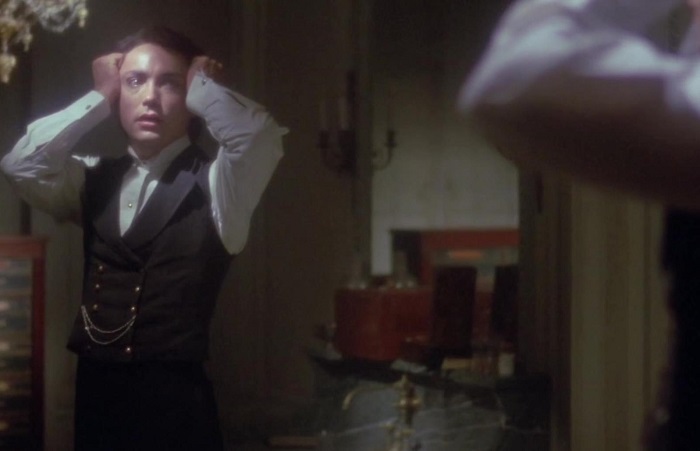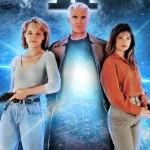
The Strange Case of Dr. Jekyll and Miss Osbourne (aka Docteur Jekyll et les femmes) is a stunning, psychosexual adaptation of Robert Louis Stevenson's classic sci-fi horror tale. Directed by Polish filmmaker Walerian Borowcyzck, it is a rather erotic exploitation take on the material, and it admittedly caught me off guard when I first sat down with the film. I had actually never heard of it before Arrow Films announced it as part of their release slate this year, nor had I heard of Borowcyzck, though I was vaguely aware of his controversial film, The Beast (1975; La Bete). Rest assured that after spending time with this film (I've watched it twice now), I will be delving deeper into the man's collected works.
I have always been fond of Stevenson's original novella but never particularly enthralled with most of the adaptations that I have seen over the years. Obviously Paramount's 1931 version with Frederic March is a clear benchmark when it comes to the property, and there are two decent adaptations* that came later on, courtesy of Hammer Films. But not too much of note has arisen since. I'm sure there are a few good eggs in the basket that I have yet to see (this was one for sure), but on the whole the rest don't linger much in the mind. Amicus' I, Monster (1971; starring Cushing and Lee) was a disappointment when I finally caught up with it a few years back, and while I have a soft spot for Stephen Frears' Mary Reilly (1996), I probably wouldn't go to bat for it as a particularly good film.
So what differentiates Borowcyzck's version? What separates it from the rest of the pack, aside from the fact that it stars a young, virile Udo Kier? Quite a bit, actually. Even eschewing the visual style on display, which is quite beautiful, it is the thematic and story differences that have drawn me in. Here, Dr. Henry Jekyll (Udo Kier) is a rather twitchy and unassuming doctor who is set to be married to Miss Fanny Osbourne (Marina Pierro). A dinner party is being held so that Henry might be sized up in terms of his worthiness of Osbourne's hand by various dignitaries and family friends. Once the party is interrupted by a murder that has occurred upstairs, the house is placed on lockdown until the perpetrator can be sussed out. Soon after, the bodies continue to pile up as the mysterious Hyde takes the guests out one by one.
The weapon used in this grisly dispatching? The killer's 14-inch penis. That's right, the fiendish Mr. Hyde is fucking his victims to death. Not one to discriminate, Hyde is fornicationally annihilating both man and woman alike with his phantasmagorical phallus. Hyde is, of course, a physically-changed Jekyll, though Borowcyzck opts to have a different actor (Gerard Zalcberg) play the chemically-altered fiend. Jekyll's formula, this time a chemical bath instead of an injection or drinkable serum, has completely unleashed his base animalistic desires to hunt, kill, and screw anything and everything that he so chooses. Needless to say that those trapped within the abode with him are none too fond of being stalked and dispatched by his raging, homicidal hard-on.
All accept one, that is. You see, Miss Fanny Osbourne truly loves her fiancee, flaws and all, and comes to embrace Mr. Hyde even moreso than Henry Jekyll. While such a turn of events isn't unprecedented in a story of this type, it is the them that Borowcyzck is exploring with such a turn that entices me more than anything. While on the surface we are merely seeing Fanny embrace her own deepest, darkest desires as she accepts the changes that her lover is going through, that's not the full picture. For those not familiar with the original tale, Miss Fanny Osbourne is not a character within it, but she is very much present in the novella in spirit.
Pulling back a bit, Robert Louis Stevenson began his career as a writer in the mid-1870s, but didn't see true success as an author until almost a decade later. His breakout hit, Treasure Island, was written and published after a vast amount of encouragement from his wife, Fanny Osbourne. A beacon of love and encouragement in his life, it was only after his marriage to Fanny that Stevenson's career truly blossomed; allowing him to craft his finest works, including Strange Case of Dr. Jekyll and Mr. Hyde. Inspired by this, Borowcyzck injected Fanny Osbourne into his adaptation as a dark but shining example of those who fall in love with the tortured geniuses of the world — women (and men) who embrace the destinies of their lovers' creatively fertile minds and gleefully trod down the path of discovery with them, no matter what the end result may be. Fanny Osbourne is a testament to such folk and this, amidst all of the sexual-charged imagery, is the most erotic thing about Borowcyzck's film. Above all else, it is what has caused me to fall head over heels for this week. Lucky for me, Arrow Films have already released a multitude of other works from Walerian, though their acquirement necessitates me finally pulling the trigger on snagging a region-free Blu-ray player. Here's hoping they eventually get released here in the U.S. like this title has.
Speaking of this release, it is just as stocked as any Criterion release, providing viewers with loads of interviews and content about the film at hand and Borowcyzck's career in general. I can't speak to how the film has looked or sounded in the past, but it is absolutely gorgeous as presented here. While it's always nice when a company like Arrow tosses out spectacular editions of our cult favorites, it's the unseen gems like these that really get me going at the end of the day. Films that would otherwise likely remain undiscovered by most. Thankfully, The Strange Case of Dr. Jekyll and Miss Osbourne is no longer such a film, and I look forward to revisiting it in the future as I begin to share it with others.
The engagement party for brilliant young Dr. Henry Jekyll (Udo Kier) and his fiancée, the beautiful Fanny Osbourne (Marina Pierro), is attended by various pillars of Victorian society. But when people are found raped and murdered outside and ultimately inside the house, it becomes clear that a madman has broken in to disrupt the festivities – but who is he? And why does Dr. Jekyll keep sneaking off to his laboratory?
- Brand new 2K restoration, scanned from the original camera negative and supervised by cinematographer Noel Very
- High Definition Blu-ray (1080p) and Standard Definition DVD presentation of the film, released on both formats for the first time ever
- English and French soundtracks in LPCM 1.0
- Optional English and English SDH subtitles
- Introduction by critic and long-term Borowczyk fan Michael Brooke
- Audio commentary featuring archival interviews with Walerian Borowczyk, Udo Kier, Marina Pierro and producer Robert Kuperberg, and new interviews with cinematographer Noël Véry, editor Khadicha Bariha, assistant Michael Levy and writer/director Noël
- Interview with Marina Pierro
- Himorogi (2012), a short film by Marina and Alessio Pierro, made in homage to Borowczyk
- Interview with artist and filmmaker Alessio Pierro
- Video essay by Adrian Martin and Cristina Alvarez Lopez
- Eyes That Listen, a featurette on Borowczyk's collaborations with electro-acoustic composer Bernard Parmegiani
- Returning to Melies: Borowczyk and Early Cinema, a featurette by Daniel Bird
- Reversible sleeve with artwork based on Borowczyk's own poster design
- Booklet with new writing on the film by Daniel Bird and archive materials, illustrated with rare stills
* Terence Fisher's The Two Faces of Dr. Jekyll (1960) and Roy Ward Baker's quite fun Dr. Jekyll and Sister Hyde (1971). Hammer actually made a third, earlier version (1959's The Ugly Duckling), but I haven't managed to see that one yet.











